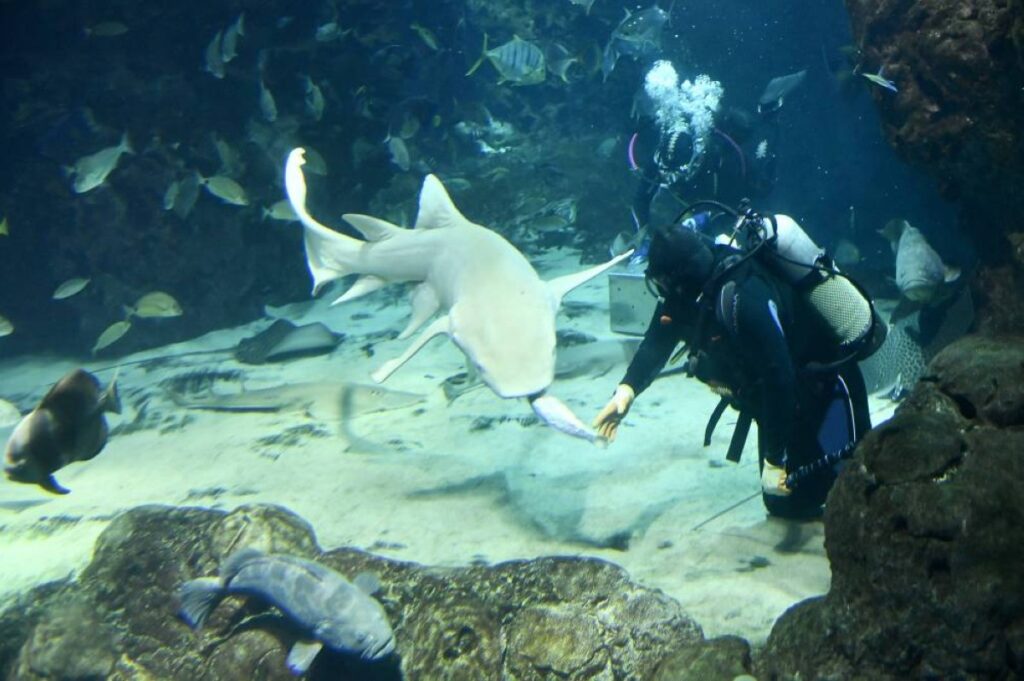By Passant Hisham
KUWAIT: As sightings of sharks increase in Kuwait’s waters during the summer months, the Kuwait Dive Team is calling for stronger awareness and protection efforts, warning that these misunderstood marine creatures face far greater danger from humans than the other way around. “Sharks have earned a bad reputation since the 1970s because of how the media portrayed them,” Kuwait Dive Team leader Waleed Al-Fadhel told Kuwait Times. “Globally, there are over 400 shark species, but only one is truly dangerous to humans — the Great White Shark,” he added. “In fact, most species found in Kuwaiti waters are harmless. In Kuwait’s entire 300-year history, only two shark-related injuries have been recorded”
Al-Fadhel explained that the rise in shark presence during summer is a natural phenomenon. Sharks are attracted to warm waters and are typically found in muddy areas up north, and to a lesser extent near coral reefs in the south, where they are generally small and non-aggressive. While the presence of sharks might alarm some beachgoers, Al-Fadhel stressed that humans pose the real threat. “Studies show that 20 to 30 percent of the global shark population has been wiped out due to harmful human practices,” he told KUNA.
Among the most damaging is shark finning — the practice of removing fins and discarding the body at sea. The fins are exported for use in what is considered the world’s most expensive soup. Al-Fadhel noted that while some fishermen in Kuwait have engaged in this trade, commercial shark fishing is now banned in the country, as the sharks play important role in maintaining marine ecological balance.
Al-Fadhel also urged the public not to feed sharks or other marine wildlife, as doing so alters their natural behavior and undermines their ecological role. “Sharks help maintain balance in the marine environment by feeding on sick or injured fish,” he said. “Feeding them changes their behavior, draws them closer to humans, and could increase the risk of unintended harm — both to the animal and the person.”
To reduce the likelihood of encounters and promote coexistence, the Kuwait Dive Team recommended avoiding diving in muddy seabeds, where sharks are more likely to be found. They also advised spearfishers against tying their catch to their bodies, as the scent of blood can attract sharks. Al-Fadhel emphasized that the purpose of awareness campaigns is not to instill fear, but to foster respect for marine life and promote safer practices.
The team, which operates under the Environmental Voluntary Foundation, has carried out multiple rescue operations across Kuwait’s coast — including around Kubbar Island, where sharks have been found entangled in abandoned fishing nets. Al-Fadhel also noted that summer months bring a surge in jellyfish populations, particularly during June and July, sometimes leading to the temporary shutdown of desalination plants due to the overwhelming numbers. To manage their impact, nets and filters are installed at water intake sites.
He described jellyfish as ancient marine organisms that migrate annually to Kuwaiti waters depending on currents and wind patterns. While the species found locally are not deadly, they can cause mild stings. Al-Fadhel recommended wearing full-body diving suits for protection and avoiding swimming in areas where jellyfish are concentrated. Like sharks, he added, jellyfish also play a vital ecological role as a food source for other marine species.

